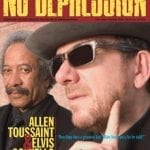Eric Ambel – We’re rolling
On an early Wednesday afternoon in April, thick, fat storybook snowflakes fall in the Williamsburg section of Brooklyn, New York. The snow settles indiscriminately on major thoroughfares and vacant side streets. It falls on a triangulated door rising out of the sidewalk concrete. What lies beneath is Cowboy Technical Services, a musician’s dream of a basement rec room.
Steve Earle has made the trek downstairs, to record the political riff-rocker “Amerika 6.0 (The Best We Can Do)” at the tail end of his Transcendental Blues tour. Ryan Adams has been there as well, laying down a trio of love songs for one of his famous girlfriends.
Today, Eric “Roscoe” Ambel has his basement studio to himself, having maneuvered his bicycle over the Williamsburg Bridge from Manhattan to come to work. If you can, in fact, call it work.
“The bike thing is a hobby,” Ambel says. “A lot of people look at music and think that that’s your hobby. For me it’s not a hobby and it’s never really been a hobby. And when I discovered the bike I realized that I’d never had a hobby, at least not in a long, long time.
“I know some young people actually go about it, thinking they’d like to have a job making music. But I never thought of it that way. A job is a job. You know, that’s something that you grow to hate. And I never wanted this to be a job. Having the diversity of doing all these different things keeps it from turning into a job.”
Ambel is a man chock full of diversions. He’s co-owner of Lakeside Lounge, an East Village pass-the-hat music bar that just celebrated its tenth anniversary. There’s the Lakeside record label, charged with making accessible not only Ambel’s backlisted solo work, but also the new album by his side group, the Yayhoos, a “relay team” of former frontmen including the Georgia Satellites’ Dan Baird.
There’s Ambel’s guitar-slinger gig with Earle (every tour since Transcendental Blues, every album since Jerusalem). There’s his nearly fifteen-year marriage to Mary Lee Kortes, whose band Mary Lee’s Corvette also has a new album that was produced by Ambel.
And then there’s Cowboy Technical, an admittedly odd handle for a Brooklyn studio until one learns of Ambel’s college days at the University of Wyoming (whose team name is the Cowboys). Though registered as a marketing major, Ambel merely flirted with the books, spending most of his scattered four years as a ski instructor and trumpet player in the Cowboys’ marching band.
Fate eventually intervened during a visit to his old stomping grounds in Illinois. “When I was home in Chicago I won tickets to see these two bands I’d never heard of, because I was working as a waiter,” he recalls, “and it was the Ramones and the Dictators.” Ambel had found his calling.
When the soil of the Cowboy State proved less than fertile for his fresh punk-rock pitch, he moved to California (“because we looked on the map and New York seemed like it would be too hard to be broke in and too cold”), gained a nickname (“I used to live on the corner of Roscoe and Reseda in Northridge”), joined Joan Jett as an original Blackheart, and rode his guitar work on Bad Reputation to the once-foreboding Empire State, where he hooked up with Scott Kempner (from those very same Dictators) in the Del Lords.
Ambel’s sensibilities, both professionally and personally, are still driven by those DIY roots. Take the start of Lakeside Lounge. After assisting with the stage design of both the Mercury Lounge and the now-defunct Brownie’s, a bad night with CBGB owner Hilly Kristal spurred Ambel to strike out on his own.
“I played a showcase at CBGB where I had booked all five bands,” says Ambel. “I had a professional band. I was paying the guys and I had paid the cartage company and my manager took all these people out to eat, you know, so we’re talking like $700 on my tab so I could play for some A&R people.
“And Hilly Kristal, after our soundcheck, puts another band on and throws the whole show off by two hours. No A&R people see my band. So I vowed never to play there again, and that’s when we started talking about having our own place.”
The beginnings of Cowboy Technical were much the same. “When I was producing,” Ambel says, “I would go to these studios and their stuff would break down in the middle of the session. And the guy would go, ‘Well, I’ll give you a free day.’ Well, that doesn’t help me. The band is out for being there. I’m out. The engineer’s out. No one’s going to pay us for the day that we lost. I just got really tired of poorly run studios.”
Since opening Cowboy Technical in 2000, Ambel has produced sessions for Nils Lofgren, Blue Mountain, Freedy Johnston and many others. He’s proud of his vintage equipment, the absence of a control room (he feels it gives him a better connection to the band), and the comfortable feel his studio provides.
“You know, in this studio there’s six chairs,” Ambel says, “and I’ve sat in each one. I’ve been the front guy. I’ve been the support guy. I’ve been technically involved. So if I can use my experience to help get the most out of each person, that’s a great thing.
“It’s like every day that you come in here you’ve got the chance to do something different, something new that you never did before. And that’s like cycling where you push hard for a while and then you recover so you can go again. You could refer to it as a control thing, but it’s also, you know, like a homemade card is always going to beat Hallmark. And I think that what we’re making here is like the homemade card.”




